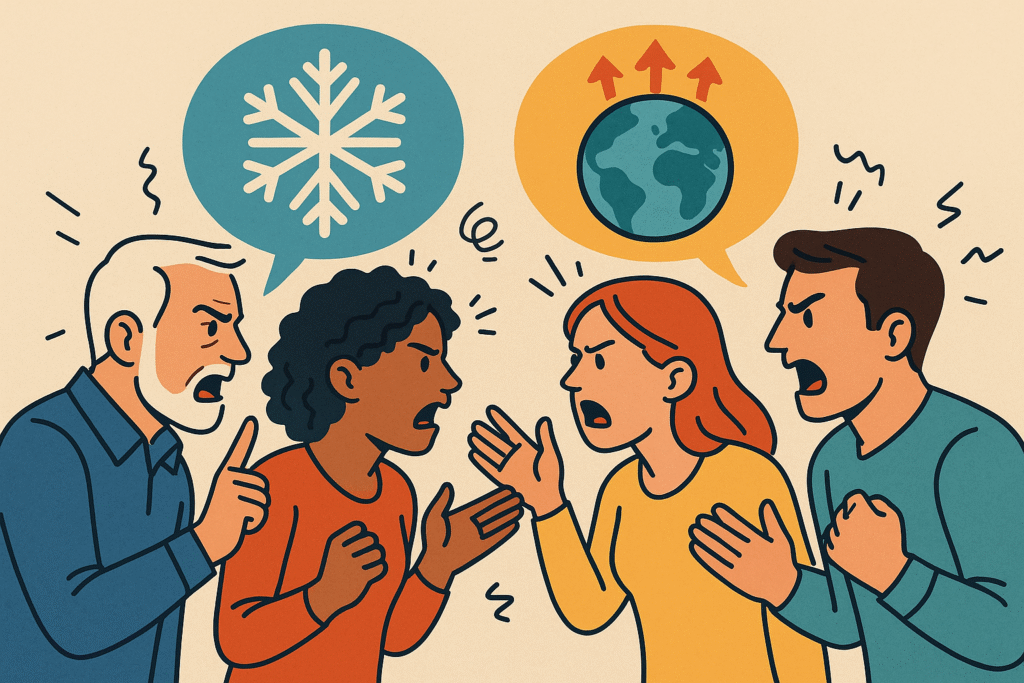Join the Weather Lovers Community at Skool
That’s a good question and one that crops up more and more, especially when the weather throws something odd at us – like snow in April or a blazing hot September.
You’ll often hear someone say, “So much for global warming!” with a chuckle, as though a cold snap disproves it all.
But that’s the tip of the iceberg (no pun intended) when it comes to why climate change is so misunderstood.
‘Climate’ and ‘Weather’ are often confused
One of the biggest reasons is the way climate and weather get tangled up.
Weather is what we see and feel each day – wind, rain, sunshine, frost – it’s the short-term stuff.
Climate is the bigger picture. It’s the average of that day-to-day weather over decades.
So, when we get a particularly cold week in winter, it doesn’t mean climate change has stopped. It might even be a symptom of it, depending on how large-scale patterns are shifting.
But to many people, that distinction is just too fuzzy. If it doesn’t feel hotter every single year, then “climate change” can seem like a load of hot air.

Another issue is that climate change doesn’t hit everyone the same way.
Some parts of the world are already feeling the heat—literally—with rising sea levels, punishing droughts, or record-breaking heatwaves.
Others, especially cooler or wetter places like the UK, might notice milder winters and longer growing seasons and think, “That’s not so bad.”
When the local impacts don’t seem disastrous, it’s easy to downplay the global risks.
Then there’s the language used to talk about it. A lot of the science behind climate change is, let’s be honest, thick as treacle.
We get bombarded with phrases like “carbon budget” and “radiative forcing” and “mitigation pathways”—all of which are important, but they don’t exactly roll off the tongue.
For folks who don’t swim in science every day, that can make it feel like something distant and inaccessible.
It’s a bit like trying to read a washing machine manual when all you want is to clean your socks.
The media doesn’t always help, either. Climate science is complicated, but the news loves a punchy headline.
That means you’ll often get dramatic bits pulled out of context – “Hottest Year on Record!”, “Snow Bomb to Hit Britain” or “Scientists Warn of Doomsday Scenario” – without the nuance that explains what it actually means and how certain it is.
Over time, this makes the subject feel like a swinging pendulum: doom one day, doubt the next. And that leaves people either confused or tuned out.
And let’s not dodge the elephant in the room—there’s been deliberate misinformation, especially from industries with skin in the game.
For decades, big fossil fuel companies quietly sowed doubt, funding campaigns that questioned the science while publicly saying, “We’re looking into it.”
That strategy echoes what the tobacco companies did in the ’50s and ’60s. If you can make people uncertain, you can delay action.
And it worked.
That doubt still lingers, even though the basic science of climate change is now rock-solid.
Social media throws petrol on the fire, too.
On one hand, it’s great that people can share climate-related stories and personal observations.
On the other, it’s a breeding ground for misinformation and conspiracy theories. A flashy TikTok about how climate change is a hoax can spread quicker than a scientific report with graphs and references.
And once people fall into those rabbit holes, it’s hard to get them back out.
Another subtle problem is that climate change is just too big. It’s slow, it’s long-term, and it often feels abstract.
It doesn’t have a single face or event to rally around. Compare that to something like a flood or a wildfire—immediate, visible, emotional.
Climate change is like a tide slowly rising under your feet. By the time you realise your socks are wet, it’s already half-way up your shins.
And finally, there’s plain old human psychology. We’re wired to react to threats that are clear and present, not ones that might gradually unfold over decades.
If there’s a lion in the room, you jump and run. If there’s a slow drip in the attic, you shrug and say you’ll fix it next week. Climate change is that drip. By the time the ceiling falls in, it’s too late.
So, why is climate change so misunderstood?
Because it’s complex, slow-moving, wrapped in jargon, and, quite often, invisible.
It touches everything and yet feels like it touches nothing directly. Add to that a healthy dose of disinformation and a splash of wishful thinking, and you’ve got a recipe for confusion.
But here’s the thing: the more local and relatable the issue becomes—like heavier rain in Durham, more intense heatwaves, or changing growing seasons—the harder it gets to ignore.
Maybe that’s the key to cutting through the fog. Bring it down to earth. Make it feel personal. Explain it like you would to a neighbour over a cuppa, not like a scientist giving a lecture.
Have you ever had a conversation where someone doubted climate change just because they were snowed in? How did you respond?
Join the Weather Lovers Community at Skool

